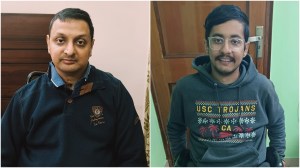Ensuring nothing but the truth
A sustainable witness protection programme is the need of the hour

Perjury laws in India need to be stringently enforced. In a growing number of cases witnesses are turning hostile and stating exactly the opposite of what they had earlier stated before the police, and sometimes even before the magistrate. The recent evidence of perjury in BMW hit-and-run case is illustrative of this sorry state of affairs. Perjury is the crime of making false statements under oath, a crime that is getting increasingly common because there is very little danger of getting punished. There is a Kannada saying: One can speak the truth since one is not speaking before a court of law!
Hard data on the incidence of perjury in India is difficult to get, and prosecutions are few and far between. The Malimath Committee 2003, in its report on Reforms of the Criminal Justice System, dealt with various aspects of the problem. The report enumerated the difficulties and inconvenience encountered by witnesses in our courts. In most courts there is no designated place with proper arrangements for the witnesses. It is also true that they are treated with scant respect. Cases drag on interminably with frequent adjournments and witnesses are put to immense difficulties. The feeling then grows, especially among ordinary people with limited means, that to get embroiled as a witness is like being caught like a fish on very long line. There is also the belief that the individual has no duty to assist the police in criminal matters and that the prevention and investigation of crime is the sole responsibility of the police.
Perjury, as we have seen in cases like the Jessica Lal murder, can seriously subvert the course of justice, even while the perjurer is allowed to get away with impunity. As far as the law is concerned, there is no lacuna. Perjury is a penal offence under sections 193 to 195 of the Indian Penal Code. Section 195 b of Criminal Procedure Code prescribes that no court shall take cognisance of perjury under section 193 to 195 IPC except on the complaint in writing of the court. But the procedure is somewhat convoluted and long-drawn. Section 344 CrPC, however, provides an alternative summary procedure empowering the court of sessions or magistrate to try the witness summarily and sentence the perjurer to imprisonment, which may extend up to three months or a fine of Rs 500 or with both. But the provision is seldom resorted to by the courts. Indeed, the response of the courts in dealing with the serious problem of perjury has bordered on indifference.
In the US, in contrast, perjury under federal laws invites a sentence of five years imprisonment. In the state of New York, the sentence has been raised to 15 years. Several prominent people have been convicted for perjury in western countries, something that is unheard of in India. They include Jeffrey Archer, British novelist and parliamentarian, Jonathan Atkins, British politician and member of John Major8217;s cabinet, and, more recently, Lewis 8216;Scooter8217; Libby, former aide to US Vice President, Dick Cheney, who was convicted on two counts of perjury along with other offences in connection with Palme Affairs.
The Criminal Law Amendment Bill introduced in Parliament in 2003 was designed to prevent the evil of witnesses turning hostile. New sections were introduced to ensure that the evidence of central witnesses be recorded by the magistrate in certain cases where investigation is of an offence punishable with death or imprisonment for seven years. Unfortunately, this provision was not passed by Parliament.
Widespread prevalence of perjury is symptomatic of the serious inadequacies marking the criminal justice system in this country. One glaring inadequacy, which has recently highlighted in legal discourse, is the lack of any witness protection programme, which often inhibits witnesses from coming forward to depose against the rich and the powerful. The Malimath Committee urged the government to enact a law to give protection to witnesses and their family members on the lines prevalent in the US and other countries. The US federal witness programme that was created in response to threats faced by the witnesses testifying against mobsters has been in existence since 1967. Round-the-clock protection has been provided to all witnesses who fear threats to their lives through the US Marshal Service. It has been used so far to rehabilitate some 8,000 witnesses and their 15,000 family members. Canada gave witness protection cover under its Witness Protection Act, 1996, to a Sikh woman who threw fresh light on the Kaniska Bombing Case.
A viable, sustainable witness protection programme is the need of the hour and we have to start immediately with a programme, however small, to prevent witnesses from turning hostile. The witness protection guidelines issued by the Delhi High Court in the case of Neelam Katara vs GOI and others 2003 could be a starting point.
The writer is a former director general, National Human Rights Commission, and senior fellow, Institute of Social Sciences
- 01
- 02
- 03
- 04
- 05































